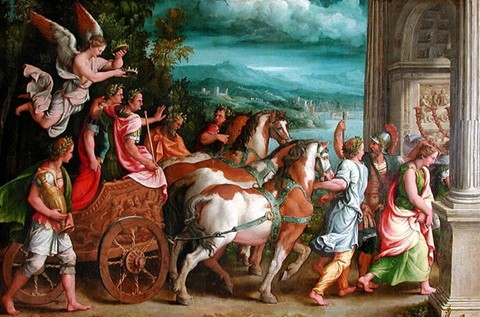
The recent Nigerien coup has put the rest of the world—or at least the part that swears love for democracy—in something of a quandary. Out deepest political principles compel us to oppose the use of force in obtaining power, especially when the afflicted regime was selected at the ballot box. Yet if the old guard was deeply rotten, do we really have the moral authority to condemn non-democratic change? Especially if, as in Niger, the incoming junta seems significantly less toxic than what it replaced:
The soldiers who overthrew Mamadou Tandja are vowing to restore civilian rule, an assertion that has often proved hollow among Africa’s myriad juntas. The difference in Niger, though, is profound: Most people here actually believe them.
“For democracy activists like us, it’s difficult to applaud a coup d’etat,’’ said Marou Amadou, a leading human rights worker who was jailed for a month and beaten by security forces during Tandja’s regime. “But this had to happen and we are overjoyed. There was no other way.’’
Though officially condemned by governments worldwide, Tandja’s ouster has been widely praised at home: by unions, human rights groups, civil society leaders, abd local media. The trust is so great, in fact, that the director of one widely respected independent Niamey newspaper was working protocol for the junta.
We have to say, though, we’re troubled by the utter pleasantness of the junta’s name: the Supreme Council for the Restoration of Democracy. In our experience, the more genial a junta’s name, the likelier it is to turn evil. Cases in point: the State Peace and Development Council, the Committe of Public Safety.
We are also discouraged by the fact that the Supreme Council has yet to update the official website of the Nigerien presidency. No good junta worth its salt should be without a webmaster these days.


hubcap // Mar 2, 2010 at 11:44 am
“No good junta worth its salt should be without a webmaster these days.”
===
That’s an interesting point. As coup followers know, the first wave of priority targets – before the presidential palace – are the airport and the state radio and TV stations. I guess we’ll know that the Internet really matters in coup-prone countries when the state website becomes a priority target and not an afterthought.
Brendan I. Koerner // Mar 2, 2010 at 1:27 pm
Good point. Niger’s a tough test case, though, since I presume their Internet usage rates are low. Still, the junta would be well-advised to take advantage of the medium–it’s certainly one of the first resources I looked at when delving into this story. The official version matters, even when it has to be taken with a grain of salt.
BTW, I viewed the page info for the Nigerien presidency site. It was designed and maintained by this guy:
http://www.himaharouna.net/
I wonder how he’s faring under the new regime.
Shaina // Mar 2, 2010 at 9:13 pm
“In our experience, the more genial a junta’s name, the likelier it is to turn evil.”
The same rule of thumb could also be applied to the names of countries as well. See: Democratic People’s Republic of Korea, Democratic Kampuchea, Democratic Republic of the Congo, etc.
* the same could also be applied to new religious movements as well: see “the People’s Temple.”
Brendan I. Koerner // Mar 3, 2010 at 8:59 am
@Shaina: As a child, the one that always confused me was the German Democratic Republic (aka East Germany).I remember asking my mom why everyone thought East Germany was bad, since it was democratic just like us. I don’t remember her reply, but it may have been nothing more than a sad shake of the head.